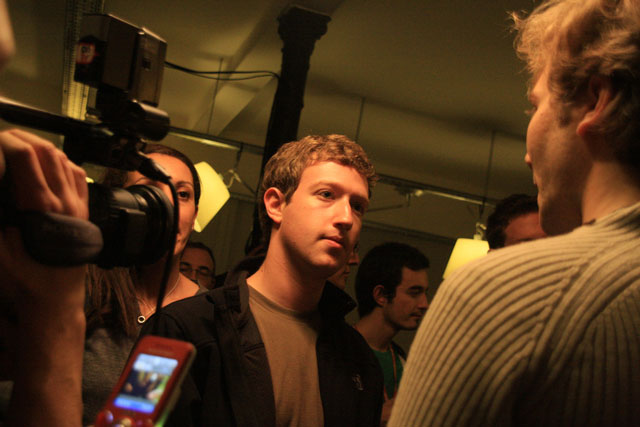
Facebook founder Mark Zuckerberg’s manifesto, penned clearly in response to accusations levelled at the social network in the wake of the bitter US election campaign, is a scary, dystopian document. It shows that Facebook — launched, in Zuckerberg’s own words five years ago, to “extend people’s capacity to build and maintain relationships” — is turning into something of an extraterritorial state run by a small, unelected government that relies extensively on privately held algorithms for social engineering.
In 2012, Zuckerberg addressed future Facebook investors in a letter attached to the company’s initial public offering prospectus. Here’s how he described the company’s purpose:
People sharing more — even if just with their close friends or families — creates a more open culture and leads to a better understanding of the lives and perspectives of others. We believe that this creates a greater number of stronger relationships between people, and that it helps people get exposed to a greater number of diverse perspectives.
By helping people form these connections, we hope to rewire the way people spread and consume information. We think the world’s information infrastructure should resemble the social graph — a network built from the bottom up or peer-to-peer, rather than the monolithic, top-down structure that has existed to date. We also believe that giving people control over what they share is a fundamental principle of this rewiring.
Whatever those beliefs were based on, they have largely failed the test of time. Instead of creating stronger relationships, Facebook has spawned anxieties and addictions that are the subject of academic studies from Portugal to Australia. Some studies have determined that using Facebook detracts from a user’s life satisfaction.
A Danish experiment in 2015, involving people weaned from Facebook for a week and a control group that kept using it, showed that people on the social network are 55% more likely to feel stressed; one of the sources of that stress is envy of the glossified lives reported by other users. Users’ well-being, research has showed, only tends to increase when they have meaningful interactions — such as long message exchanges — with those who are already close to them.
In his latest manifesto, Zuckerberg uses parenting groups as an example of something his company does right. But recent research shows that some new mothers use Facebook to obtain validation of their self-perception as good parents, and failing to get enough such validation causes depressive symptoms.
As for the “rewired” information infrastructure, it has helped to chase people into ideological silos and feed them content that reinforces confirmation biases. Facebook actively created the silos by fine-tuning the algorithm that lies at its centre — the one that forms a user’s news feed. The algorithm prioritises what it shows a user based, in large measure, on how many times the user has recently interacted with the poster and on the number of “likes” and comments the post has garnered. In other words, it stresses the most emotionally engaging posts from the people to whom you are drawn — during an election campaign, a recipe for a filter bubble and, what’s more, for amplifying emotional rather than rational arguments.
Bragging in his new manifesto, Zuckerberg writes:
In recent campaigns around the world — from India and Indonesia across Europe to the US — we’ve seen the candidate with the largest and most engaged following on Facebook usually wins.
In the Netherlands today, liberal Prime Minister Mark Rutte’s page has 17 527 likes; that of fiery nationalist Geert Wilders, 174 188. In France, rationalist Emmanuel Macron has 165 850 likes, while far-right Marine Le Pen boasts 1,2m. Helping them win is hardly something that would make Zuckerberg, a liberal, proud — but, with his algorithmic interference in what people can see on his network, he has created a powerful tool for populists.
Zuckerberg doesn’t want to correct this mistake and stop messing with what people see on the social network. Instead, the new manifesto talks about Facebook as if it were a country or a supranational bloc rather than just a communication-enabling technology.
Zuckerberg describes how Facebook sorts groups into “meaningful” and, presumably, meaningless ones. Instead of facilitating communication among people who are already part of social support groups offline, he wants to project Facebook relationships into the real world: clearly, that’s a more effective way of keeping competitors at bay.

The Facebook chief executive says his team is working on artificial intelligence that will be able to flag posts containing offensive information — nudity, violence, hate speech — and pass them on for final decisions by humans. If past experience is any indication, the overtaxed humans will merely rubber-stamp most decisions made by the technology, which Zuckerberg admits is still highly imperfect. Zuckerberg also suggests enabling every user to apply the filters provided by this technology:
Where is your line on nudity? On violence? On graphic content? On profanity? What you decide will be your personal settings. We will periodically ask you these questions to increase participation and so you don’t need to dig around to find them. For those who don’t make a decision, the default will be whatever the majority of people in your region selected, like a referendum. Of course you will always be free to update your personal settings anytime.
The real-life effect will be that most users, too lazy to muck around with settings, will accept the “majority” standard, making it even less likely that anything they see would jar them out of their comfort zone. Those who use the filters won’t be much better off: they’ll have no idea what is being filtered out because Facebook’s algorithms are a black box.
Zuckerberg casts Facebook as a global community that needs better policing, governance, nudging toward better social practices. He’s willing to allow some democracy and “referendums”, but the company will make the ultimate decision on the types of content people should see based on their behaviour on Facebook. Ultimately, this kind of social engineering affects people’s moods and behaviours. It can drive them toward commercial interactions or stimulate giving to good causes but it can also spill out into the real world in more troubling ways.
It’s absurd to expect humility from Silicon Valley heroes. But Zuckerberg should realise that by trying to shape how people use Facebook, he may be creating a monster. His company’s other services — Messenger and WhatsApp — merely allow users to communicate without any interference, and that simple function is the source of the least controversial examples in Zuckerberg’s manifesto. “In Kenya, whole villages are in WhatsApp groups together, including their representatives,” the Facebook CEO writes. Well, so are my kids’ school mates, and that’s great.
People are grateful for tools that help them work, study, do things together — but they respond to shepherding in unpredictable ways. “Virtual identity suicide” is one; the trend doesn’t show up in Facebook’s reported usage numbers, but that might be because a lot of the “active users” the company reports are actually bots. If you type “how to leave” into the Google search window, “how to leave Facebook” will be the first suggestion. — (c) 2017 Bloomberg LP

